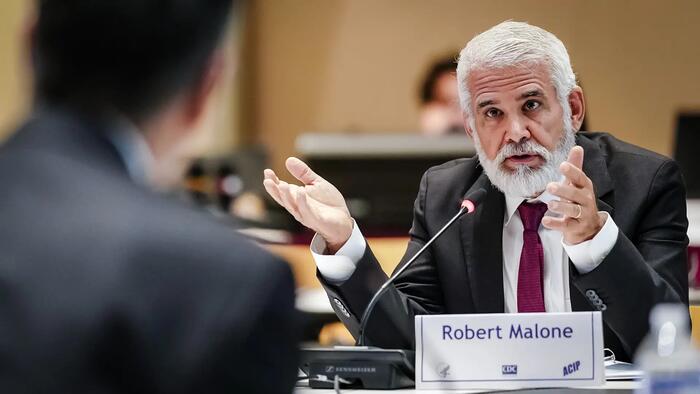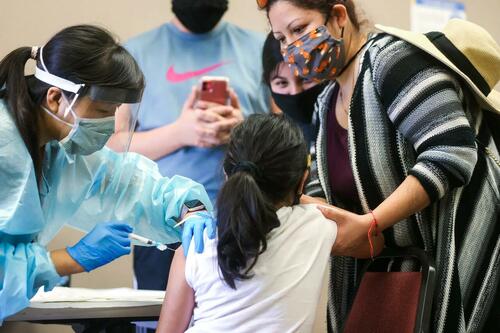


Authored by Zachary Stieber via The Epoch Times (emphasis ours),
The vaccine advisory committee remade by Health Secretary Robert F. Kennedy Jr. plans to look at multiple other vaccines, after it voted to advise officials to stop recommending influenza shots that contain mercury.
Martin Kulldorff, the new chair of the Advisory Committee on Immunization Practices (ACIP), said on June 26 that one proposal is to tell the Centers for Disease Control and Prevention (CDC) to make clear that young children should not receive the measles, mumps, rubella, varicella (MMRV) combination immunization.
Instead, the CDC would recommend that children under the age of 47 months receive two separate vaccines: the measles, mumps, rubella shot, and the varicella, or chickenpox, vaccine.
The change would reflect data that indicate the MMRV combination vaccine causes more febrile seizures, he said. The CDC said the same thing in a background paper on the subject dated June 25.
A vote on the matter could occur as early as the next meeting, which is expected to take place in August or September.
Kulldorff, an epidemiologist who was fired by Harvard Medical School for declining a COVID-19 vaccine, also announced two new work groups, or subcommittees.
One will examine the impact of vaccines on the childhood immunization schedules.
“It is important to evaluate the cumulative effect of the recommended vaccine schedule,” Kulldorff said. “This includes interaction effects between different vaccines, the total number of vaccines, cumulative amounts of vaccine ingredients, and the relative timing of different vaccines.”
Researchers with the CDC and other institutions said in a 2022 paper that exposure to aluminum in vaccines was associated with asthma, although they said that additional investigation was required to confirm a link.
The second subcommittee will examine vaccines that have not been reviewed in more than seven years, including the hepatitis B vaccine, the first dose of which the CDC recommends at birth for infants.
“Unless the mother is hepatitis B positive, an argument could be made to delay the vaccine for this infection, which is primarily spread by sexual activity and intravenous drug use,” Kulldorff said.
Kulldorff declined in an email to The Epoch Times to say whether he'd been directed by Kennedy to look at the measles vaccines, or to reveal any other proposals the committee plans to take up at its next meeting.
The Department of Health and Human Services, the CDC’s parent agency, did not respond to a request for comment, including on whether Kennedy directed the committee to vote on vaccines containing the mercury-based preservative thimerosal.
Kennedy, earlier in June, removed all 17 members of the ACIP and replaced them with Kulldorff and others.
During the committee’s first meeting since the replacements, it advised the CDC to add a second monoclonal antibody treatment against respiratory syncytial virus (RSV) for infants.
Dr. Robert Malone, a new ACIP member, told The Epoch Times that there was extensive discussion on the antibody at the subcommittee level and that one of the reasons he voted in favor was to provide another option against the virus, given how stock of the existing antibody ran low in the past.
Retsef Levi, another ACIP member, told The Epoch Times he voted against making the second antibody available to all infants because of concerns over a lack of granular data from clinical trials for both products. He would have supported letting high-risk infants receive the new antibody.
Kulldorff also voted in favor of the antibody. He participated despite being a paid witness in a legal case against Merck, which manufactures the new antibody, in January.
Dr. Joel Lexchin, a professor at the University of Toronto who has studied conflicts of interest, told The Epoch Times via email that Kulldorff “had a clear conflict and should not have voted.”
Kulldorff has not responded to requests for comment about potential conflicts of interest. He said during the meeting he did not have any conflicts related to the issues at hand.
Lexchin previously told The Epoch Times that some of the members ousted by Kennedy should have abstained from certain votes after they received money from pharmaceutical companies that stood to be affected.
The new advisers also voted to keep in place the CDC’s recommendation that virtually all individuals aged at least 6 months receive an influenza vaccine on an annual basis, before they advised the CDC to stop recommending thimerosal-containing flu shots.
About 5 percent of the flu shots administered in recent months contained thimerosal, according to the Food and Drug Administration.
Members who voted in favor of removing thimerosal said they wanted to cut down on controllable sources of mercury exposure. Dr. Cody Meissner, the only no vote, said he didn’t see a safety issue with the amount of mercury in influenza vaccines and that he was concerned the vote would imperil influenza vaccine access for some.
The FDA and Sanofi, an influenza vaccine manufacturer, said that the supply would be sufficient without the thimerosal-containing vaccines.
The meeting did not involve much debate or discussion on general influenza vaccination, according to Malone.
“We were presented with essentially language that was already approved and and had to make a decision about whether or not to endorse ... a universal influenza vaccine recommendation, as has been the case for decades. The decision was that this was not the time to fight on that hill about the universal influenza vaccine recommendation,” Malone told The Epoch Times.
Panel member Vicky Pebsworth abstained from the vote, citing a lack of discussion.
Malone said at the close of the meeting that he would be part of a subcommittee focused on influenza and that he anticipated considering “the long-standing issue of immune imprinting and original antigenic sin, which may or may not be a concern in the case of routine annual influenza vaccination.”
Immune imprinting refers to when previous vaccinations or infections leave behind an immune memory, causing the body to produce antibodies targeting that memory, even if a new variant or vaccine is introduced.
Vaccinating people annually against influenza may be counterproductive due to imprinting, Malone told The Epoch Times.
Read the rest here...

